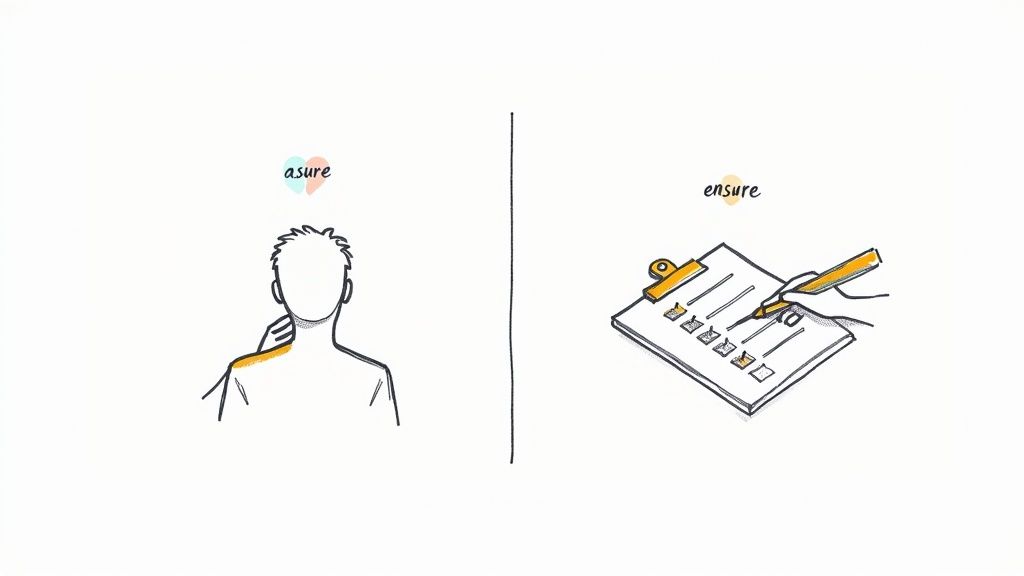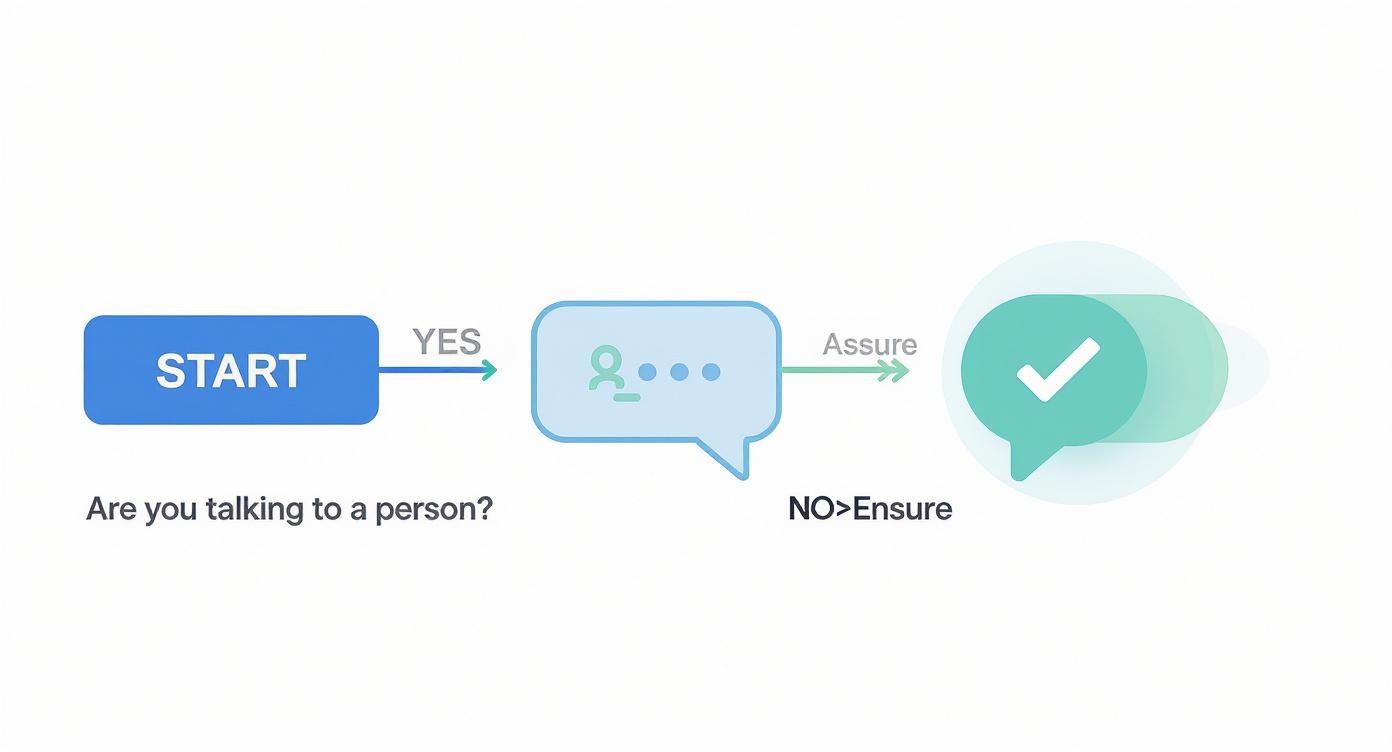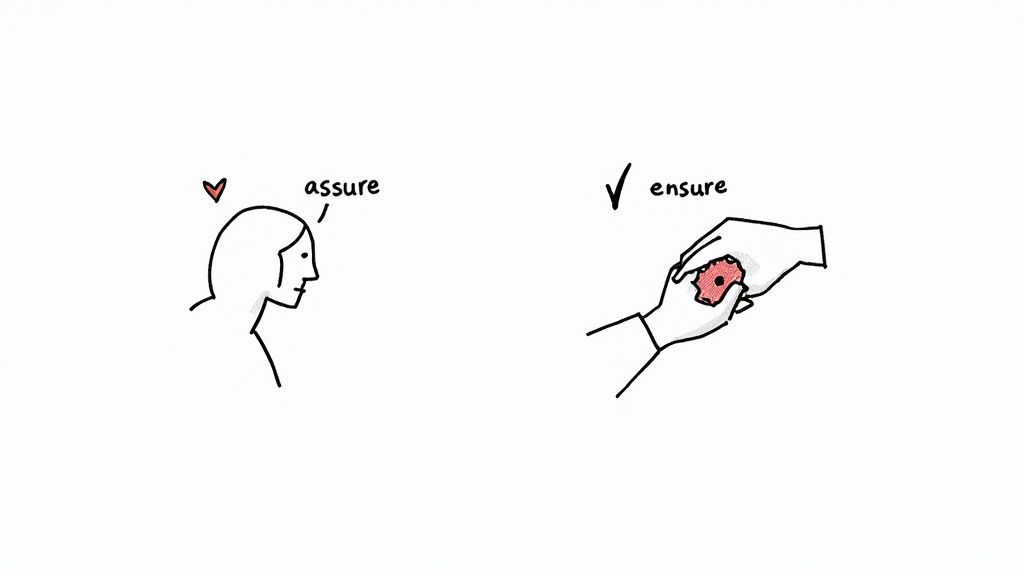Assure or Ensure: How to Choose the Right Word for Your Content

Deciding between assure or ensure boils down to a simple rule: you assure a person, but you ensure an outcome. Think of 'assure' as a way to give someone confidence. On the other hand, 'ensure' is all about taking concrete steps to make certain something happens.
Getting this right is crucial, especially for content creators. According to a recent survey, over 70% of readers say that clear, precise language is a key factor in trusting a brand's content. Let's make sure your writing hits the mark.
Understanding the Core Difference
It's easy to see why "assure" and "ensure" get mixed up, but they play very different roles in a sentence. The easiest way to remember the difference is to think of it as communication versus action. One word manages feelings, while the other manages results.
For example, as a content marketer, you might assure your client that the blog post will resonate with their audience. This is a verbal promise meant to build their confidence. But to ensure it resonates, you need to research keywords, analyze audience data, and write compelling copy.
A Simple Mental Checklist for Writers
Not sure which word fits? Just ask yourself one quick question: am I talking to a person or about an outcome?
- Talking to a person? Use assure. Your goal is to give them confidence.
- Talking about an outcome? Use ensure. Your goal is to guarantee a result.
To make this even clearer, here's a quick side-by-side look at how they function in a professional context.
Assure vs Ensure: At a Glance
| Aspect | Assure (For People) | Ensure (For Outcomes) |
|---|---|---|
| Primary Goal | To build confidence or remove doubt in a person. | To guarantee a specific result or event happens. |
| Type of Action | A communicative act; a promise or declaration. | A physical or procedural act; taking steps. |
| Example | "I assure you, the content will be ready by Friday." | "We added it to the calendar to ensure we meet the deadline." |
| Object | Always directed at a person (client, reader, team member). | Directed at an event, condition, or result. |
This table neatly sums it up. As a writer or marketer, you use 'assure' to manage client expectations and 'ensure' to manage your workflow and deliver quality.

As you can see, the path is clear. If your sentence is about giving a reader or client peace of mind, 'assure' is the word you're looking for. If it’s about making something happen, 'ensure' is the right choice.
Paying attention to these small details can make a huge difference in your effectiveness. If you're looking to sharpen your skills further, check out our guide to master basic grammar rules.
Using Assure to Build Confidence
When you need to set someone's mind at ease or make a promise, assure is your go-to word. Think of it as a human-to-human action. It's not about making something happen; it's about making someone feel more confident that something will happen.
A marketing manager might assure their team that the new campaign has a solid strategy. This doesn't launch the campaign, but it calms nerves and boosts morale. The action is verbal, but the impact is emotional.

It’s All About People
The core difference really comes down to who—or what—is on the receiving end. Assure is always directed at a person. It’s a verbal handshake, a way of removing doubt for your clients, readers, or colleagues.
This personal connection is vital in any professional environment. A CEO telling her company, "I assure you, your hard work is not going unnoticed," directly addresses a fundamental human need for recognition and builds trust.
Here's the golden rule for creators: 'Assure' always needs a person to work. You have to assure somebody of something. This is the key that separates it from 'ensure,' which focuses on outcomes, not feelings.
This distinction is especially important when you're composing an important email or report. Using ‘assure’ properly signals that you understand and care about the recipient's perspective. For more tips, see our guide on how to write professional emails.
When to Use Assure: Real-World Examples
So, where does ‘assure’ fit into your work as a creator or professional? It’s all about managing relationships and expectations.
- For Marketers: You might assure a client that their feedback has been incorporated into the latest draft, building their trust in your process.
- For Students: You could assure your professor that you've understood the assignment's requirements before you begin writing.
- For Content Creators: A blogger can assure their readers that all sponsored content will be clearly marked, maintaining transparency.
In every case, one person is giving their word to another to provide peace of mind. This is a subtle but powerful part of communication that AI tools often get wrong, sounding robotic and impersonal. At PureWrite, we help you refine that AI draft, making sure your words build the real connections you need.
Using Ensure to Guarantee Results
Now, let's switch gears to ensure. This is your word for action and certainty. If ‘assure’ is making a promise, ‘ensure’ is creating the process to deliver on it. When you use this word, you’re taking active steps to guarantee a specific outcome.
For content creators, this is about the work behind the scenes. You don't just hope your article ranks on Google; you use SEO best practices to ensure it has the best possible chance. Using ‘ensure’ tells your audience you’re in control and committed to quality.

Taking Action for Tangible Outcomes
At its core, ‘ensure’ is about making something a certainty through tangible actions. While ‘assure’ lives in the world of feelings and confidence, ‘ensure’ operates in the realm of facts, processes, and logistics.
Here’s a simple analogy: A social media manager can assure their boss that the upcoming post will get good engagement. But they use a scheduling tool and check analytics to ensure it goes live at the optimal time. One is perception, the other is practice. You can dig deeper into this in our guide on how to improve business communication.
The main takeaway is simple: 'Ensure' focuses on the how. It implies there's a system, a process, or a specific action being taken to lock in a desired result.
How to Use Ensure in Practice
Using ‘ensure’ correctly makes your writing sound proactive and reliable. It’s a word that signals competence, which is exactly the tone you want in your professional or academic work.
Let's look at a few examples for writers and students:
- Content Creation: "We will use a plagiarism checker to ensure the article is 100% original."
- Project Management: "Please create a shared folder to ensure everyone has access to the files."
- Academic Writing: "I will cite all sources in APA format to ensure academic integrity."
See the pattern? Each sentence describes a clear action taken to guarantee a result. This is the kind of human nuance that AI-generated text often misses. With a tool like PureWrite, you can easily refine your drafts to reflect this level of intention and precision.
Why This Matters in Professional Writing
In fields like marketing, academia, and business, your word choice is your credibility. The difference between assure and ensure might seem small, but it shows you have a command of the language. Get it wrong, and you risk creating confusion or sounding unprofessional.
Think about it: a company might assure its customers that their data is safe. That’s about building confidence. But to ensure their data is safe, that same company must implement encryption and security protocols. Mixing those up in a privacy policy could have serious consequences.

Upholding Clarity and Credibility
In the professional world, trust is built on clear communication. When you use words like assure and ensure correctly, you're sending a subtle but powerful signal: you pay attention to detail, and you mean what you say.
This isn't just about sounding smart. In business writing, clarity is key. To assure a stakeholder is to offer a promise and manage a relationship. To ensure a result is to take action and guarantee an outcome. The two are fundamentally different commitments.
Using the right word isn't just about being correct—it's about being understood. Ambiguity can be costly, making the distinction between a promise and a process absolutely essential.
Nailing these details is a big part of growing as a professional. If you're looking to sharpen your communication, there are great resources on how to improve writing skills that can help.
The AI Challenge: Nuance and Authenticity
As helpful as AI writing tools are, they often trip over the subtle, human context that separates words like assure and ensure. An AI can generate a grammatically perfect sentence that still feels "off" or robotic, creating the very ambiguity you’re trying to prevent. It lacks the authentic voice that connects with readers.
This is why ethical AI usage is so important. You should use AI as a starting point, not the final product. At PureWrite, we’ve designed our platform to help you bridge that gap. We help you catch those nuanced mistakes, refining your AI-generated drafts to ensure your final text has the clarity, precision, and authority it needs.
Common Mistakes and How to Fix Them
Even when you know the rules, it's easy to mix up assure and ensure when you're writing quickly. The most common slip-up? Using "ensure" when you're talking directly to a person. It can sound a little cold or even robotic.
Let's look at a classic example: "We will ensure you that our process is efficient." Something about that feels off, right? That’s because you’re speaking to "you"—a person. You are trying to give them confidence, which is a job for assure.
Spotting and Correcting Errors in Your Drafts
The secret is to look at what comes right after the word. If you see a person or a pronoun like "you," "her," or "the client," then assure is almost always the right call. If the word is followed by an outcome or a "that" clause pointing to a result, you'll want to use ensure.
Here are a few before-and-after examples:
Incorrect: "The editor tried to ensure the writer that the feedback was constructive."
Correct: "The editor tried to assure the writer that the feedback was constructive." (Why? Because the editor is speaking to a person.)
Incorrect: "Please assure that all links are working before publishing."
Correct: "Please ensure that all links are working before publishing." (Why? The focus is on the outcome—working links.)
A simple mental check is to ask: "Am I making a promise or guaranteeing a process?" A promise is made to a person, so you assure them. A process is put in place for a result, so you ensure it happens.
Getting this right is a lot like mastering other small but important details in writing. If you're looking to sharpen those skills, our guide on compound and complex sentences is a great next step.
Ultimately, catching these little errors makes your writing feel more polished. It’s the kind of subtle mistake that AI-generated drafts often miss. That’s where we come in. At PureWrite, we help you find and fix those robotic-sounding phrases, turning them into something that sounds genuinely human.
Still Wondering About Assure and Ensure?
Even after breaking it all down, a few common questions tend to pop up. Let's tackle those head-on so you can feel completely confident choosing between these two words in your next piece of content.
Think of this as your quick-reference guide to iron out any last-minute wrinkles.
Can You Use Assure and Ensure in the Same Sentence?
Absolutely. In fact, using them together can be a powerful way to show you understand the difference. It lets you cover both the human element and the practical outcome in one smooth thought.
Here’s a great example for a content creator: "I can assure you that we have followed all SEO best practices to ensure the article ranks well."
See how that works? "Assure" gives confidence to the person ("you"), while "ensure" is about the actions taken to guarantee the result (good ranking).
What About the Word Insure?
This is the third cousin in the word family, and it's the easiest to separate. Insure is strictly about financial protection. It’s what you do when you buy a policy to cover a potential loss.
Let’s line them up for clarity:
- Assure: Reassuring a person.
- Ensure: Making an outcome happen.
- Insure: Protecting something with an insurance policy.
So, you might assure a client their expensive equipment will arrive safely and ensure it’s packed carefully, but you would insure the package in case it gets lost or damaged.
Is Ensure More Formal Than Assure?
Not necessarily. Formality isn't baked into the words themselves; it's all about context. "Assure" works perfectly in a formal report to a client or a casual email to a teammate when you're trying to set someone's mind at ease.
"Ensure" often appears in technical or business documents where guaranteeing a result is critical. But you could just as easily tell a classmate, "Let's double-check the rubric to ensure we hit all the points." Both are versatile; just pick the one that fits the specific meaning you’re aiming for.
Getting these details right is what separates good writing from great writing. AI can generate text quickly, but it often lacks the authentic touch that connects with a human reader. At PureWrite, we specialize in transforming that robotic text into authentic, engaging prose. Try PureWrite today to humanize your content and ensure your message truly lands.